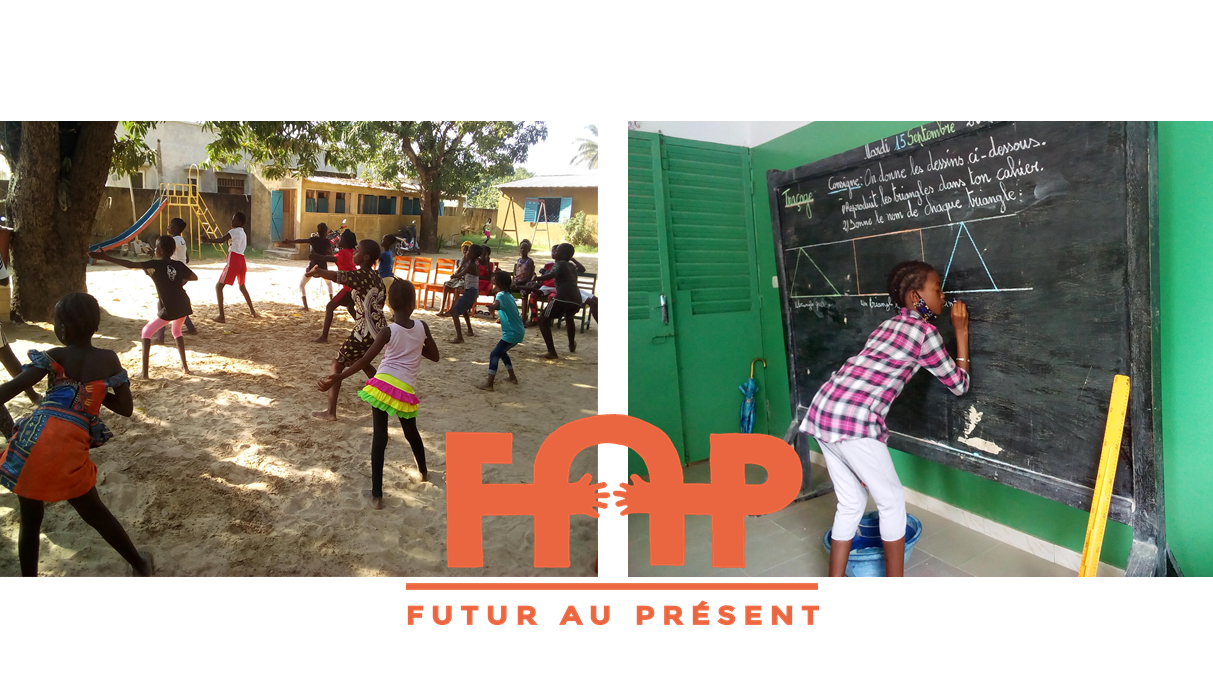LET'S DISCOVER "LA MAISON DE L'ÉDUCATION" PROJECT IN SENEGAL
The Societe Generale The Future is You Foundation has sponsored the 'Maison de l’Éducation' ('education centre') project since February 2020: can you tell us more about the project?
The Maison de l'Éducation (MDE), a Futur Au Présent project is a multi-year project whose aim is to help prevent children leaving school too early and going to work, and this mainly concerns girls living in the working-class district of Kandé, Ziguinchor in the Casamance Region of Senegal. These young girls generally come from underprivileged families and tend to leave school very early in order to work and contribute to their family income.
To break this vicious cycle that leads to poverty and to give these young girls a more promising future, the MDE works with the families’ consent to get them back into the school system by taking on all the costs and providing educational assistance and psychosocial support for the individuals and families. It also offers opportunities to take part in a certain number of social, cultural and sports activities that can help with their personal development and empowerment (theatre, cinema, dance, yoga, IT skills, etc.). Health monitoring is also available.
Every day, as a complement to the public school system, the team of teachers and social workers at the MDE welcomes 120 girls between 6 and 14 years old outside normal school hours.
By taking a global approach to the fight against poverty and the protection of children, the MDE project also offers support to the families of these young girls by creating activities to generate income and / or, where necessary, to improve their living conditions (small renovations, access to electricity, etc.). By taking this approach, we hope to help improve the socio-economic situation of the families and enable the girls to continue their education over the longer term.

In 2020, in view of the pandemic, what challenges did you face and how have you since adapted your activities to ensure that the programme continues to be as successful as possible?
The Covid-19 health crisis has impacted the project, as the MDE had to close its doors in March 2020, at the same time as the public schools. However, the commitment of the team remained as strong as ever. They found ways of ensuring the ongoing education of the girls at the MDE and avoiding the risk of them dropping out of school, as the precarity of their families could accentuate this risk.
The solutions they found mainly consisted of distance learning by broadcasting lessons on a local television channel, home coaching, and the distribution of ‘leisure kits’. The MDE was able to open again in early September by adapting the timetable for attendance and organising the activities in half-classes in the mornings and afternoons. We were able to resume normal working as of November, when the schools reopened for the 2020-2021 school year.
This period allowed us to experiment with new teaching techniques and to learn as we went along. For example, the teaching staff noticed that using the television channel to teach, which had been seen as a really good solution given the situation, had its limits and meant that other teaching methods would also be needed.
Home schooling by the MDE teachers, with the right preventive measures, proved to be far more suitable. Once or twice a week, they went to the pupils’ houses to correct their work, explain any areas of difficulty and hand out a new set of exercises. This approach turned out to be more appropriate in terms of the quality of learning, the continuity of schooling and maintaining links with the young girls and their families.
We realised, counter-intuitively, that the children, when faced with a television screen, were less able to concentrate. The presence of teachers in the home was far more beneficial in terms of learning than broadcasting lessons on a screen.
Babacar Gueye, Maison De l'Education Manager
As we start 2021, how do you see the project developing?
We hope that the project will be able to continue without being hindered by the effects of the Covid-19 health crisis. If this is the case, we will continue to organise all our activities, while paying special attention to the level of education and learning among the girls we support. Because, despite the alternative and rearranged educational activities we managed to put in place during the closure of the MDE, there was nevertheless a drop in the overall level.
More generally speaking, this crisis has made us even more aware (as if we weren’t before) that the situation for already vulnerable families can worsen at any time, due to events beyond our control. So, in the future, we must develop programmes that can be adapted to an environment that might change very quickly.
The really positive aspect nevertheless remains the great motivation shown by the teams in trying to find solutions to maintain the quality of support. Difficult situations fortunately also help to strengthen solidarity and collective action.
